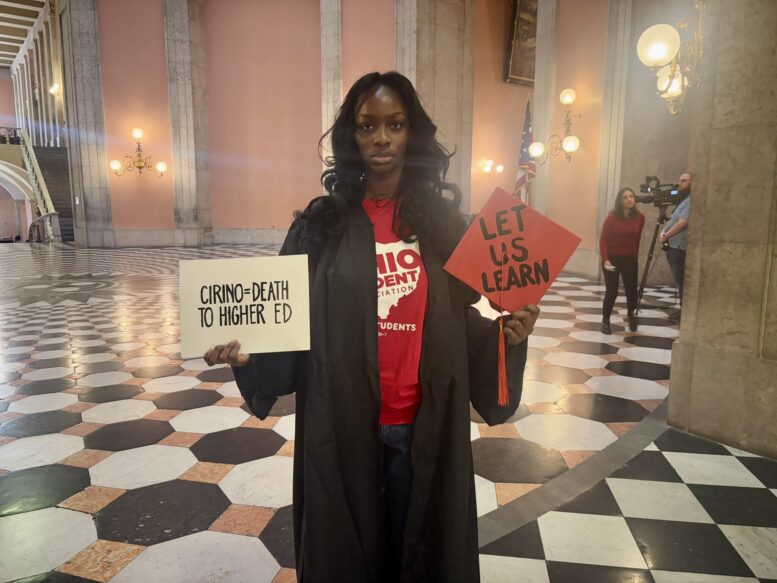BY MEGAN HENRY
The Ohio Senate passed a controversial higher education bill that would overhaul the state’s public universities during Wednesday’s session. This came one day after more than 800 Ohioans submitted testimony against it. Fourteen people provided supporter testimony. The sponsor of the bill called those numbers “irrelevant.”
Ohio Senate Bill 1 was passed by a 21-11 vote. All nine Democrats and two Republicans — Bill Blessing and Tom Patton — voted against the bill, which will go to the Ohio House for consideration. (BGIN editor’s note: State Sen. Theresa Gavarone, R-Bowling Green, voted in favor of the bill.)
State Sen. Jerry Cirino, R-Kirtland, introduced S.B. 1 less than a month ago.
“This is needed reform to enhance and make higher education in Ohio better,” Cirino said. “We have to constantly be moving the goal line here for us to be better, to respond to the changes demographically and in the workforce demands for the jobs that our graduates are taking.”
Protester opposing S.B. 1 erupted in chants moments after the bill passed, shouting, among other things, “Who killed higher ed? The Ohio Senate did! Who killed higher ed? Senator Cirino did!”
The protesters continued their chants with the names of different lawmakers as they exited the Senate chamber.
When asked why this bill was fast-tracked through the Senate, Senate President Rob McColley, R-Napoleon, said the Senate passed a nearly identical bill that Cirino put forward during the last General Assembly.
“Everybody’s minds are pretty much made up as to what we should do in this regard, so we didn’t see the reason to delay this process any further,” he said.
Gavarone in response to a request for comment from BG Independent News issued the following statement: “SB 1 is student-focused, merit-based, and promotes free speech and diversity of thought on college campuses. Over the years, I’ve heard from university students from all over the state who felt they could not write a paper or speak out on an issue unless it conformed to their professor’s one-sided, usually liberal, beliefs for fear of ridicule and a bad grade. This bill protects the free speech rights for all students as well as professors and administrators. SB 1 ensures that parents and students who pay tuition to a university in advance don’t lose that investment due to a faculty strike outside their control. SB 1 increases transparency by requiring public disclosure of course syllabi and university financial plans, and it explores measures to reduce tuition costs for students and families. There is still more work to be done to ensure college campuses are centers for free thought and innovation, but SB 1 is a step in the right direction to ensure Ohio students are equipped with the education and skills necessary to succeed in that next chapter in life.”
[Get the Ohio Capital Journal’s The Eye-Opener: The Morning Headlines delivered to your inbox.]
What is in Senate Bill 1?
S.B. 1 would ban diversity and inclusion efforts, prevent faculty from striking, set rules around classroom discussion, put diversity scholarships at risk, shorten university board of trustees terms from nine years down to six years, and require students take an American history course, among other things.
Regarding classroom discussion, it would set rules around topics involving “controversial beliefs” such as climate policies, electoral politics, foreign policy, diversity and inclusion programs, immigration policy, marriage, or abortion.
The bill stipulates classroom discussion allows students to “reach their own conclusions about all controversial beliefs or policies and shall not seek to indoctrinate any social, political, or religious point of view.”
“A lot of it is related to making sure that diversity of thought is practiced as a policy in our universities and community colleges,” Cirino said.
S.B. 1 would affect Ohio’s public universities and community colleges, not private universities.
Senate Democrats tried to make several amendments to S.B. 1 during Wednesday’s Senate Session, but none of the amendments were adopted.
Less than 24 hours before Wednesday’s Senate vote, more than 800 people submitted testimony opposing S.B. 1 during Tuesday’s Ohio Senate Higher Education Committee meeting which lasted more than eight hours.
But when asked about the number of opponents his bill received, Cirino said “the sheer numbers are irrelevant.”
Fourteen people submitted supporter testimony on S.B. 1 at a previous committee meeting.
“I wouldn’t view that as a scientific measure of the general support statewide or opposition statewide, to what this actually is,” McColley said when asked about the overwhelming opposition to S.B. 1.
Senate discussion

There was two hours of discussion about the bill during Wednesday’s Senate session before the vote took place. All nine Senate democrats spoke against the bill while four Republicans voiced their support of the bill.
“Students are going to leave the state and go somewhere else where their abilities to learn and express free speech aren’t subject to this law,” said state Sen. Bill DeMora, D-Columbus. “This bill is the worst bill.”
The quality of education suffers when legislators gain the authority to control what is taught in universities, said state Sen. Casey Weinstein, D-Hudson.
“This bill invites political interference into academic matters,” he said.
Minority Senate Leader Nickie J. Antonio, D-Lakewood, said S.B. 1 is a detriment to Ohio’s higher education.
“The premise of the bill is that somehow public universities are bastions of liberalism trying to indoctrinate our children,” she said. “I think it will make the state of Ohio universities not favorable to students, especially students with diverse backgrounds that are looking for places to be their full, complete selves.”
State Sen. Kristina Roegner, R-Hudson, spoke in favor of the bill.
“We want Ohio’s colleges and universities to be places where students reach their full intellectual potential, where research and critical thinking are promoted, where free speech is encouraged and where innovation is nurtured and performance is rewarded to be the best, we must be a meritocracy,” she said.
Many college students and faculty have said they would leave Ohio if S.B. 1 passed, but Cirino said he doesn’t believe there is going to be a mass migration out of the state.
“I believe that the better we enhance higher education in Ohio, the more attractive we’re going to be to students of all types,” he said. “I would never participate in anything that destroyed higher ed.”
(BG Independent News contributed to this story.)





